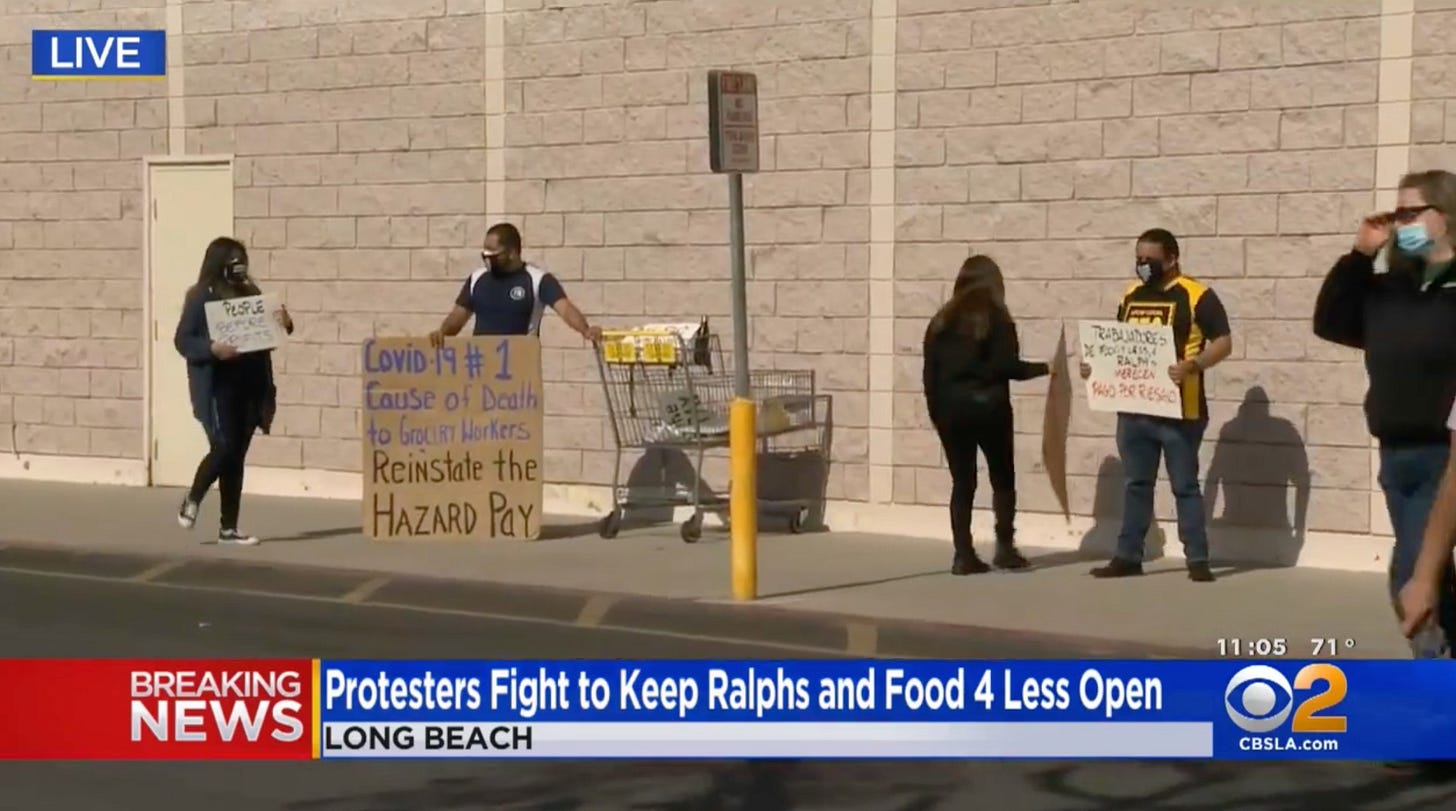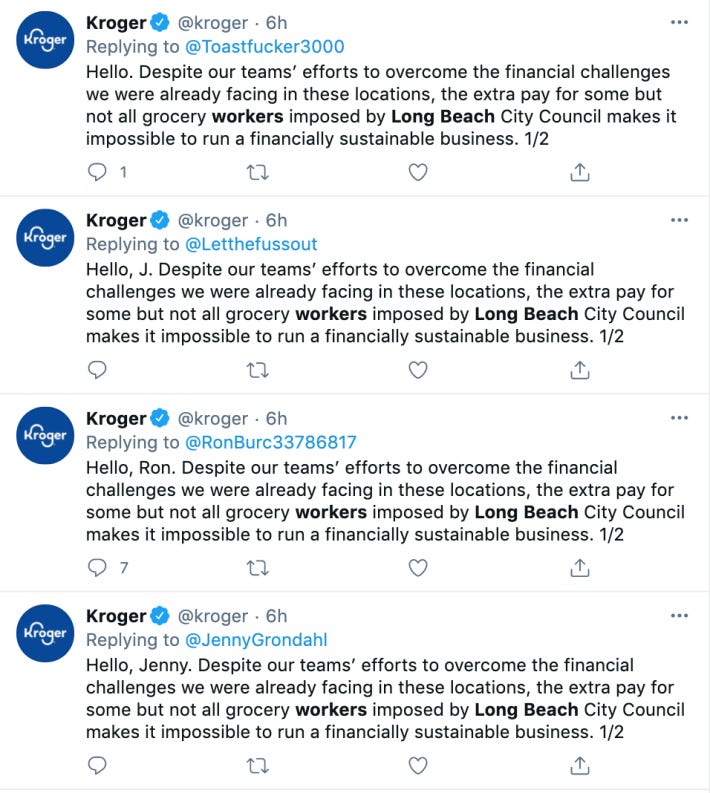The Shameless Greed of Kroger, Our New Capitalist Supervillain
The Kroger Company is pulling in record, billion-dollar profits—and refusing to pay its frontline workers an extra $4 an hour.
This week, The Kroger Company—the largest supermarket chain in the United States—announced that it would close two stores in Long Beach, CA. On its face, the announcement wouldn’t necessarily have been particularly noteworthy, but we wouldn’t be here if these were everyday casualties in the natural ebb and flow of retail. Instead, the closures were in direct response to a new city law mandating an extra $4 an hour for grocery workers during the COVID-19 pandemic. The decision immediately prompted a backlash.
The so-called “hero pay” law requires grocery stores with at least 300 workers nationwide and more than 15 employees within the city of Long Beach to pay the extra hourly wage for a 120-day period. That was apparently too much to ask, so Kroger decided to shutter a Ralphs and a Food 4 Less. This affected 200 employees who’ve spent the last year putting their lives in danger and making far too little in the first place for their work to keep doors open and the business going.
The company asserted that the stores were “underperforming” even before the new city mandate and offered a bizarrely bratty statement for a choice that they were supposedly going to make anyway regardless of the new law: “This misguided action by the Long Beach City Council oversteps the traditional bargaining process and applies to some, but not all, grocery workers in the city. The irreparable harm that will come to employees and local citizens as a direct result of the City of Long Beach’s attempt to pick winners and losers, is deeply unfortunate.”
This is just another example of workers getting simultaneously screwed by employers, the government, and the system that runs them both (✌️💰 capitalism baby ✌️💰), which is run-of-the-mill in normal times and run-of-the-mill, but especially evil roughly 11 months into a pandemic. Kroger had previously enacted a $2 per hour boost for supermarket employees, but that lasted less than two months into the pandemic. Two months! In May 2020, the corporate powers-that-be took a look around and said “OK, that should do it!”
Then, seven months later, when the Long Beach City Council said “Uh, actually…” they picked up their toys and went home.
The message here could not be clearer: Kroger would literally rather close up shop than pay its employees a remotely fair wage. An extra $4 an hour is a pittance for workers who already make so little while putting their own health, and the health of their loved ones, at risk. With an endlessly sputtering federal stimulus rollout and a failure across the board to protect the lives and livelihoods of Americans who cannot simply work from home, hazard pay seems like the very least local municipalities could offer. It was still apparently too much to ask of an enormous corporation whose CEO, Rodney McMullen, made $21.1 million in 2019. I would sincerely love to know what Mr. McMullen does to deserve such a disgustingly large salary while his employees—who, as frontline workers, are likely to be disproportionately women, people of color, and immigrants—lose their jobs over an extra $4 an hour.
Other cities in California, from Los Angeles to San Jose, as well as other cities across the country, have either already moved forward with hazard pay or are considering hazard pay ordinances. While not nearly enough, and sorely overdue, these developments are a good thing. But Kroger’s actions following the new Long Beach law serve as a chilling reminder of just how little protection millions of workers really have, and how even basic motions toward government support can prove to be useless in the face of cold-blooded capitalist overlords.
As the Long Beach store closures were announced, Kroger also warned that it could potentially shut down more stores in response to hazard pay laws elsewhere, which would come off as a cartoonishly wicked threat coming from a faceless entity if it wasn’t, in fact, a very real threat coming from a cartoonishly wicked faceless entity that has demonstrated zero shame in publicizing its preference for money over human beings.
The problem here outside of Capitalism: Bad and Rich People: Evil is that we are seeing in very real time the ways that business can not just influence, but defy the government (an already pitiful, and barely useful operation when it comes to the problems of 2021). As the push for a federal $15 minimum wage continues—which, by the way, would increase the pay of about 42 percent of grocery store workers nationwide—Kroger’s decision to close two stores under pressure to increase pay for its workers is already being used as a sign that we should be wary of giving people more money. This, nearly a year into a public health crisis that has threatened workers at every turn—physically, mentally, economically—is a slap in the face for millions of people already at the end of their rope. We can afford to do better. It's a tragedy we don't.
The California Grocers Association has already filed a lawsuit against the city of Long Beach and it also released a positively bitchy statement from president and CEO Ron Fong, claiming that, “A $4/hour increase represents about a 28 percent increase in labor costs for grocers. There’s no way grocers can absorb that big of a cost increase without an offset somewhere else, considering grocers operate with razor thin margins and many stores already operate in the red.”
“No way,” huh? I’m no mathematician, but let me try to work through this mind-bending business puzzle. Kroger reportedly made more than $2.9 billion in profits by the end of the third quarter of 2020—an extra $1.2 billion in earnings compared to the same time in 2019. The company also spent nearly a billion dollars in 2020 to buy back stock shares. And yes, the pandemic boost also came with costs, as the company reportedly spent $1.3 billion on safety measures and compensation for workers during the health crisis. What a drag! But according to McMullen, “2021 will be even stronger than we previously anticipated.” Record profits in 2020 and an even stronger 2021? Again, I’m not a numbers guy, but it seems like a billion dollars in new profit might be enough to cover workers making less than $20 an hour. Speaking of which, Trader Joe's just went nationwide with a $4 “thank you” wage to match ordinances in Seattle and California. It goes without saying that there are no “good” billion-dollar companies—Trader Joe's has done horrible things throughout the pandemic—but if one huge entity can do it, so can an even bigger one.
This, of course, is how it always works. Corporations will never value employees over the bottom line, the people at the top will continue to take home more money per year than anyone needs in a lifetime, and any small push in the direction of workers’ rights will elicit a reaction designed to frighten the push for even more, even when that “more” is outdated at this point. It’s maddening, and it’s a good reminder that companies like Kroger (or Whole Foods) won’t ever give an inch. The grim reality of endless, thankless, unsafe, and precarious work for many is the world billionaires want. The labor movement has no choice but to fight to take more.
It’s unclear what will happen to each of the 200 workers affected by the store closures. Some will be transferred and some will lose their job. In the meantime, they’re doing one of the few things workers can do: protest.
Meanwhile, Kroger seems to be paying its social media managers and/or reply bots to burn the midnight oil replying to every tweet about the situation.
According to Mayor Robert Garcia, Long Beach is prepared to face the grocers association in court, and whatever happens there could set a powerful precedent for workers and companies moving forward, even as we crawl toward a post-COVID world.
In an interview with the Los Angeles Times, Long Beach Ralphs manager Ivan Love told the paper that he feared that even a transfer to another store could threaten his hours or title, a frightening prospect while earning $17 an hour during a pandemic.
“If they don’t care about you now ... what makes you think they’re gonna care for you by transferring you out?” said Love, who was sporting a mask that read “How may I help you?"
A worker with a deeply precarious employment status wearing a safety mask bearing the words “How may I help you?” as his employer turns a blind eye to him and his fellow employees (and customers, for that matter) is a statement that doesn’t need any added weight in the form of commentary from me. It says exactly everything you need to know.






